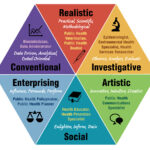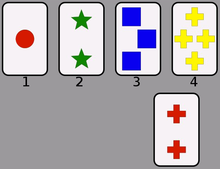Psychological tests are objective and standardized measures of a sample of behavior. Psychological tests are objective in how they are administered and scored. Psychological tests are used in a variety of settings like educational settings, clinical settings, organizational settings, and research settings. There are five major categories of psychological tests:
- Achievement tests
- Measure learning in a specific academic area
- Examples: ACT, GRE, tests in school
- Personality tests
- Used to diagnose personality disorders (clinical) or describe a person (non-clinical)
- Examples: Woodworth Personal Data Sheet (objective), MMPI (objective), NEO-PI-3 (objective), EPPS (objective), Rorschach Inkblot Test (projective), Thematic Apperception Test (projective)
 Rorschach Inkblot Test Example Card
Rorschach Inkblot Test Example Card
- Interests and attitudes
- Used for career development
- Examples: Strong Interest Inventory, Holland-based tools, CareerLocker Assessment Tools, MBTI Career Report, Career Genogram
 Strong Interest Inventory Categories
Strong Interest Inventory Categories
- Neuropsychological tests
- Measures brain functioning in clinical settings
- Examples: Halstead-Reitan Neuropsychological Battery, Mini-Mental State Exam (MMSE), Wisconsin Card Sorting Test, Bender Visual-Motor Gestalt Test

Wisconsin Card Sorting Test Example. You have to figure out if the sorting rule is by color, shape, or number.
- Mental ability tests
- Measures intelligence (IQ), creativity, and problem-solving
- Used in screening for learning disabilities and giftedness
- Examples: Stanford-Binet, WAIS
Hogan, T. P. (2013). Psychological testing: A practical introduction. (Third Edition). Hoboken, NJ: John Wiley and Sons.